A look at the month’s best reviewed crime novels, mysteries, and thrillers.

Alison Gaylin, The Collective
(William Morrow)
“Gaylin’s prose, so achingly pure yet electric in its gathering rage, pulls readers so far into the abyss in which these women live that it feels entirely plausible … readers may be prompted to ask: Are evil acts always reflective of evil hearts, their perpetrators forever beyond redemption? Is there any way to atone for one’s mistakes, no matter how grave? Full of twists, The Collective also raises fascinating questions about the echo chamber of social media and the righteousness of rage—maternal or otherwise. Even after reading its shattering conclusion, you might be drawn back to the beginning of this blistering novel in search of every last breadcrumb Gaylin has dropped.”
–Paula L. Woods (Los Angeles Times)
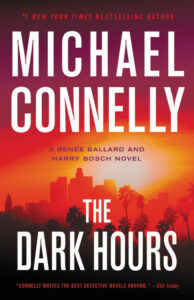
Michael Connelly, The Dark Hours
(Little Brown)
“… extraordinary … This is the fourth novel Connelly has written about Ballard, the third in which Bosch plays a significant role, and they just keep getting better. He’s one of the best in the business at writing about investigations and creating intense suspense, but the relationship between Ballard and Bosch—a professional friendship that grows out of two brilliant minds dedicated to the same difficult but important work—is the cherry on top.”
Colette Bancroft (Tampa Bay Times)
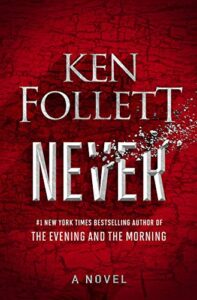
Ken Follett, Never
(Viking)
“Never is both an up-to-the-minute thriller that explores the tensions and conflicts of the modern world and a sprawling, globe-spanning saga that contains multitudes … The resulting portrait of a world stumbling toward the unthinkable is credibly detailed and alarmingly plausible … Never is a cautionary tale about the power of unintended consequences, and it is disturbing and illuminating in equal measure. Follett has always been an accomplished storyteller, but his latest reflects a sense of urgency that lifts it well above typical apocalyptic thrillers. Never is first-rate entertainment that has something important to say. It deserves the popular success it will almost certainly achieve.”
–Bill Sheehan (The Washington Post)
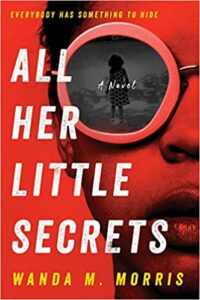
Wanda M. Morris, All Her Little Secrets
(William Morrow)
“The first-person narrative will hold the reader captive as Ellice struggles under a tremendous burden of moral and ethical issues, both personal and professional. Then comes danger, when she realizes something definitely illegal is going on within the company. Woven into the story is an eye-opening look at what it is to fight all the -isms of being Black and female in America. Ellice is a compelling and multidimensional hero in this must-have debut that will be embraced by all legal-thriller readers.”
–Jane Murphy (Booklist)
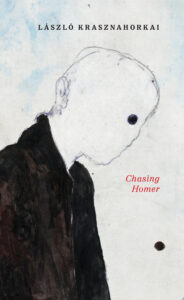
László Krasznahorkai (transl. John Batki), Chasing Homer
(New Directions)
“The novella reads much like a parable of Kafka’s, but it invokes the wanderings of Homer’s Odysseus … The mood of paranoia is conveyed by the author’s signature long, pulsing, run-on sentences, although the translation by John Batki is much more casual than the virtuosic work of Mr. Krasznahorkai’s usual collaborator, Ottilie Mulzet. Slang phrases like ‘in a hot second’ tend to disrupt the writing’s hypnotic effect. More successful is the novella’s packaging as a multimedia art object. Accompanying the text are eerie illustrations by Max Neumann and percussive, arrhythmic music by Szilveszter Miklós, which is accessed by QR codes at the start of each chapter.”
–Sam Sacks (Wall Street Journal)

Hervé Le Tellier (transl. Adriana Hunter), The Anomaly
(Other Press)
“The Anomaly takes the narrative form of a script for a post-modern sci-fi made-for-television series. There are also elements of literary thriller and social satire. Unifying all these strands is Le Tellier’s admirable skill at keeping readers in suspense: for a long time it is not clear what this story is ‘about,’ yet he continues to draw us into an increasingly complex plot, which is laid out in a succession of clues and strange coincidences … Le Tellier offers plenty of clever insights into the worlds of flawed people whose lives have now become matters of scientific curiosity … The most absorbing aspects of The Anomaly are not generated by its complicated plot, but the world Le Tellier immerses us in. Each chapter is filled with exacting detail … an entertaining philosophical critique, suggesting that nothing is as it seems, knowledge is imperfect, and the human predicament will perhaps always be more inexplicable than we can admit to ourselves.”
Thomas Filbin (The Arts Fuse)
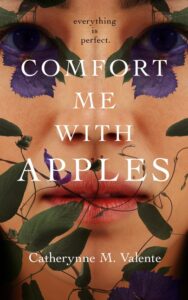
Catherynne M. Valente, Comfort Me With Apples
(Tor)
“Valente truly embraces mysteries—not just that of the story she’s telling, but also in the genre she’s playing in and what puzzle box she’s giving to her readers. While this may seem like a domestic mystery from the outside, once you start turning pages, more and more trappings fall away as the true shape of this tale is revealed … it won’t take you long to read, but it’s effect on you is going to last for a very long time. For this isn’t just a book of mystery: it is also a horror story, through and through … Page by page, uneasiness followed by embarrassment, a pivot into gut-deep fear, it’s almost enough to make a reader queasy, the constant ups and downs … Valente hammers readers with uncertainty as we see moment by moment the effects of aggressive gaslighting and tender manipulation, even as her prose shines, describing this perfect world built for Sophia … it is a bittersweet mystery you’ll savor every bite of, no matter how hard it is to swallow.”
–Martin Cahill (Tor.com)
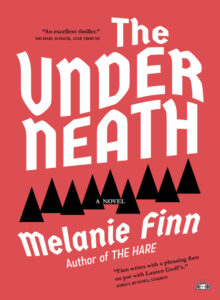
Melanie Finn, The Underneath
(Two Dollar Radio)
“Finn does an excellent job of keeping the reader guessing, and the tension in the narrative always comes across as organic, never manipulative … The Underneath is an excellent thriller, and Finn has a gift for prose that’s hard-boiled but not clichéd. Perhaps most important, her characters are true to life … There’s much to admire about The Underneath, and Finn’s third novel proves that she’s deeply original, a writer who’s not content with rehashing old tropes that have become overly familiar in some thrillers … It’s an excellent book, even if it’s not likely to appeal to readers with congenital optimistic streaks.”
–Michael Schaub (Star Tribune)
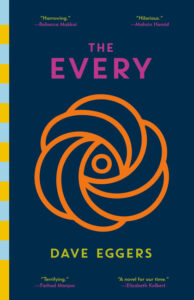
Dave Eggers, The Every
(Vintage)
“Once a decade a book like The Every advances the frontier of literary excellence: a book that reflects our culture. Predicts our future. Worm-holes into our subconscious. Delivers artful and complex characters, metaphor, ideas, narrative. Provides percussive movements of levity, gravity, grace, suspense, hilarity. Encourages deep discussion. The book’s genius is also reinforced by Dave Eggers’s pitch-perfect satiric observations of modern (mostly liberal progressive) anxieties … Plot-wise, The Every is simple … Eggers leads us like the ghost of Christmas future … The Every will feed the furnace of moral outrage on actual social media while satirizing that social media moral outrage on every page.”
–Karri Arsenault (Boston Globe)


















